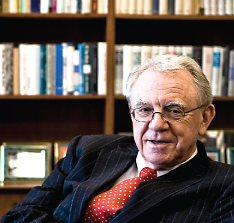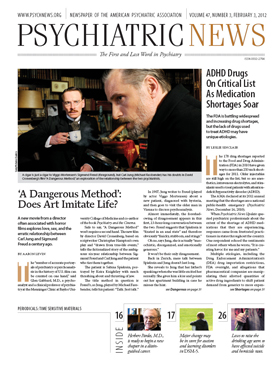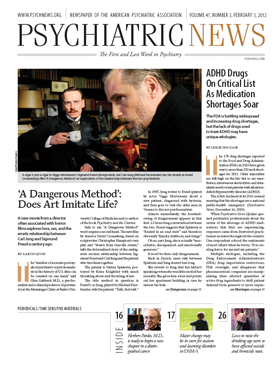Herbert Pardes, M.D., a past president of APA and one of the towering figures of modern psychiatry, has stepped down as president and chief executive officer of New York-Presbyterian Hospital and New York-Presbyterian Healthcare System.
He will still be active as executive vice chair of the board of the hospital. But the change in roles marks the end of an 11-year stint as president and CEO in which Pardes oversaw the merger of Columbia University Medical Center and Weill Cornell Medical Center under the umbrella of the New York-Presbyterian Healthcare System and the emergence of New York-Presbyterian as one of the premier academic medical centers in the world.
His stepping down from the presidency has been the occasion for multiple tributes to an individual who during a 40-year career has served in virtually every capacity imaginable for a psychiatrist—private practitioner, training director, department chair, medical school dean, federal agency director, and leader of an internationally renowned hospital system.
Prior to joining the hospital in 2000, Pardes served as vice president for health sciences and dean of the faculty of medicine at Columbia University College of Physicians and Surgeons. He was director of the National Institute of Mental Health (NIMH) and U.S. assistant surgeon general from 1978 to 1984 and APA president for the 1989-1990 term. And he was chair of the Association of American Medical Colleges 1995-1996.
Pardes is perhaps most widely admired for his role in championing the growth of citizen advocacy groups, especially the National Alliance for Research on Schizophrenia and Depression (now the Brain and Behavior Research Foundation), but also the National Alliance on Mental Illness, the National Depressive and Manic-Depressive Association, and the Anxiety Disorders Association of America.
He was among the first to see the immense value in partnering with such groups and brought a unique talent for bringing diverse—and potentially competitive—parties together to work toward a common vision.
“Herb has extraordinary energy and remarkable vision as a leader in psychiatry but an even greater knack for inclusiveness, enlisting others to share in his vision,” said APA Medical Director and CEO James H. Scully Jr., M.D. He recalled that Pardes hired him for his first job in psychiatry at the University of Colorado, where Pardes had been department chair from 1975 to 1978.
“He has been an exemplary leader of, and advocate for, academic psychiatry and one of the most important figures in raising public awareness about the importance of psychiatric research,” said Scully.
Pardes continues to be involved with the Brain and Behavior Research Foundation today as a member of its Scientific Council. Started by a small group of family and friends of mentally ill individuals determined to increase the pace of research on mental illnesses, the organization was originally incorporated in 1981 as the American Schizophrenia Foundation.
In 1985, the organization became the National Alliance for Research on Schizophrenia and Depression (NARSAD), and in 2011, the organization again “rebranded” itself, becoming the Brain and Behavior Research Foundation. Since awarding the first NARSAD grant in 1987, the foundation has distributed nearly $300 million in research grants to more than 3,100 scientists in the United States and around the world.
“Herb’s vision was the impetus for an extraordinary initiative bringing together world-class researchers in mental illness and nurturing future researchers,” Carolyn Robinowitz, M.D., past APA President said. “This required deft ‘people skills’ and the ability to get disparate interests to unite behind a common vision.”
Steven Sharfstein, M.D., president and chief executive officer of Sheppard Pratt Health System and a former APA president, called Pardes a giant not just of American psychiatry but of all of medicine.
“No individual has been more productive in the last 25 years in raising funds for research in mental health from both private and public sources,” Sharfstein said. “His untiring example of advocacy is in the best tradition of Dorothea Dix.”
In an interview with Psychiatric News, Pardes spoke of a “special fondness” for APA and recalled his years both as director of NIMH and as president of APA, working with such former and current APA leaders as the late Melvin Sabshin, M.D., former medical director; the late Jay Cutler, former director of government relations; Harold Pincus, M.D., former director of research; and Robinowitz, who was deputy medical director of APA when Pardes was APA president.
It was a time when the work of destigmatizing mental illness and raising the profile of psychiatric research was gaining traction. “As a team we did well and fought a lot of battles to increase attention to psychiatry and the need for funding of psychiatric research and support for local training,” Pardes said.
As a measure of the success of those early battles, Pardes noted that in the early 1980s there were few psychiatry departments with any substantial investment in research. “Today, it is not uncommon for psychiatry to be among the largest research agendas in an academic medical center,” he told Psychiatric News.
“Psychiatry has been strengthened tremendously in terms of its position within organized medicine,” said Pardes, who recalled that in his medical school days a student who expressed an interest in psychiatry was liable to be asked why he or she didn’t want to become a “real doctor.”
“Today we are a much more accepted part of the medical establishment than we ever were,” he said. “When I was a medical student, there was one medical school dean who was a psychiatrist. Today, there are psychiatrist deans all over the country, and it is not unusual that when a school seeks a new dean, they often look first to psychiatry.”
Asked to name the contributions that have meant the most to him, Pardes pointed to his leadership in helping to build New York-Presbyterian into a world-class institution and to his role in facilitating the growth of the citizen and family advocacy movement.
He recalled that as director of NIMH, he was speaking to a member of Congress about funding for psychiatric research and happened to have brought along with him a woman whose son had a severe and persistent mental illness.
“I spoke for a little while, then I asked this mother to tell her story,” Pardes recalled. “She spoke about the difficulties that she and her son faced. And when she was done, this congressman turned to his aide and said, ‘Let’s make sure we get the funding.’ The power of collaboration between professionals and citizen groups is enormous.”
As for the future, Pardes told Psychiatric News that he hopes to establish a policy center at New York-Presbyterian devoted to addressing the challenges facing academic medicine today, focusing on their value in producing quality medical care and lowering costs.
In his role as executive vice chair of the board, Pardes is certain to be actively involved in the leadership of the hospital and hospital system. In what might be considered by those who have followed his career to be an understatement, he said, “I’m not a big fan of watching the grass grow beneath my feet.”


